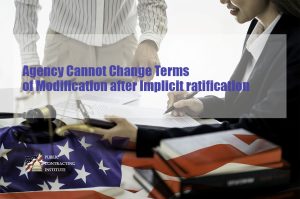The Civilian Board of Contract Appeals recently considered a case of an agency seeking to change a modification after there was implicit ratification of a contract additional hurricane emergency services. Crowley Logistics,Inc. v. Dept of Homeland Security. CBCA 6188, April 9, 2020. The basic message of the case is that if a contract is already modified through an implicitly ratification, the contractor does not have to accept further agency changes by acceding to a second ratification.

Here are the basic facts:
- In August 2016, the Department of Homeland Security (“DHS”) awarded a contract to Crowley with a $4 million ceiling for disaster response and shipping.
- Crowley’s contract was the only one prepositioned to support intra-island logistics in Puerto Rico or the U.S. Virgin Islands.
- In August 2017 three separate hurricanes (Harvey, Irma and Maria) significantly affected the Virgin Islands and Puerto Rico
- In October 2017, the Contracting Officer issued modification 4 to Crowley’s contract which significantly expanded the scope and increased the contract ceiling from $4 million to $100 million (eventually increased), extended contract performance, and added new Contract Line Item Numbers. However, the contracting officer who signed on behalf of DHS had a warrant limited to $25 million.
- Two Officials with unlimited contracting authority in the Office of the Chief Procurement Officer, FEMA/DHS were aware of this issue, and directed Crowley to continue operations under the modification. DHS was aware of a problem in the modification, and that it required supporting data to justify the costs that Crowley incurred.
- DHS ultimately ratified a total payment of $114 million to Crowley, an amount it found “fair and reasonable.” In making this express ratification, DHS effectively changed the pricing terms in the written modification for eleven of the Contract Line Item Numbers (“CLINs”), reducing what DHS was willing to pay for those CLINs.
- Crowley submitted a claim for $60 million for services performed in excess of the allowed amount in DHS’s ratification.
The Board held that there was sufficient knowledge (including constructive knowledge) to support an implicit ratification of the modification without the change in the text of the eleven CLINs insisting on fair and reasonable prices. The Board noted that DHS’s authorized contracting officers implicitly ratified the modification in October or November 2017, well before DHS’s subsequent “express ratification” pursuant to FAR 1.602-3. DHS insisted for months that Crowley continue work that could have no contractual basis except the modification, without providing Crowley any notice of defects in its contract, and DHS, through silence and consistent actions, ratified the modification as written.
Most importantly, the Board held that because authorized individuals within DHS impliedly ratified the modification, Crowley was now entitled to the same rights to compensation, reimbursement and indemnity as it would have had if this act had been previously authorized. A ratified act has the same effect as if it had been authorized ab initio, and ratification confers retroactive authority on the agent-employee. Unauthorized contracts become binding, as written, through ratification.
The Board said that “having been ratified, the modification is enforceable according to its terms [and DHS] had no right, months later, to use express ratification provisions in FAR 1.602-3 to change the pricing terms of that modification.
Takeaway:
- Always ensure that your contracting officer has an adequate warrant to award or change (through modification or otherwise) your contract. If you are in doubt, the FAR permits you to obtain a copy of the contracting officer’s warrant.
- Agencies should be careful, even under emergency situations (such as 3 hurricanes) to comply with the FAR, or correct mistakes quickly.
- If emergency actions necessitate unauthorized deviations from the FAR (such as awarding a contract without an adequate warrant), this should be immediately corrected, or at least the contractor should be advised so it can cease performance until the error is corrected.
For other helpful suggestions on government contracting, visit:
Richard D. Lieberman’s FAR Consulting & Training at https://www.richarddlieberman.com/, and Mistakes in Government Contracting at https://richarddlieberman.wixsite.com/mistakes.



